The LAMP Educator’s Learning Community was established in 2019. It was heavily informed
by a workshop given by Milton Cox at the 2018 Original Lilly Conference for College
Teaching. Learning communities for college teachers have historically been termed
Faculty Learning Communities (FLCs). However, in order to be inclusive of college
educators who are not faculty, we chose to instead call our community an Educator’s
Learning Community (ELC). In our ELC, we use Change Theory, Resistance Theory and
Effective Implementation Practices to support prior fellows and catalyze continued
shift to active learning / student-centered practices. Our specific goals are:
1) support prior fellows who have shown demonstrable dedication to implementing evidence-based teaching practices, measuring impacts on student learning and disseminating their findings (e.g. publication, presentation or establishment of related programming) / continued LAMP involvement
2) catalyze continued transformation of classrooms from being teacher-centered to being learner centered / spread ripples about active learning successes using the approach that is most known to be successful: people talking to people over time.
3) establish both an institution-wide and state-wide, sustainable community of STEM educators.
These goals dovetail with UW’s Strategic Plan (Explicitly: Goal 1, Bullet 4.2, Goal 4, Bullet 1.3&4).
April 4, 2025
A panel conversation with some members of the LAMP Educator's Learning Community:
December 5, 2024
UW Educators learn and present at the 2024 Lilly Conference on College Teaching - check out more by visiting this press release.
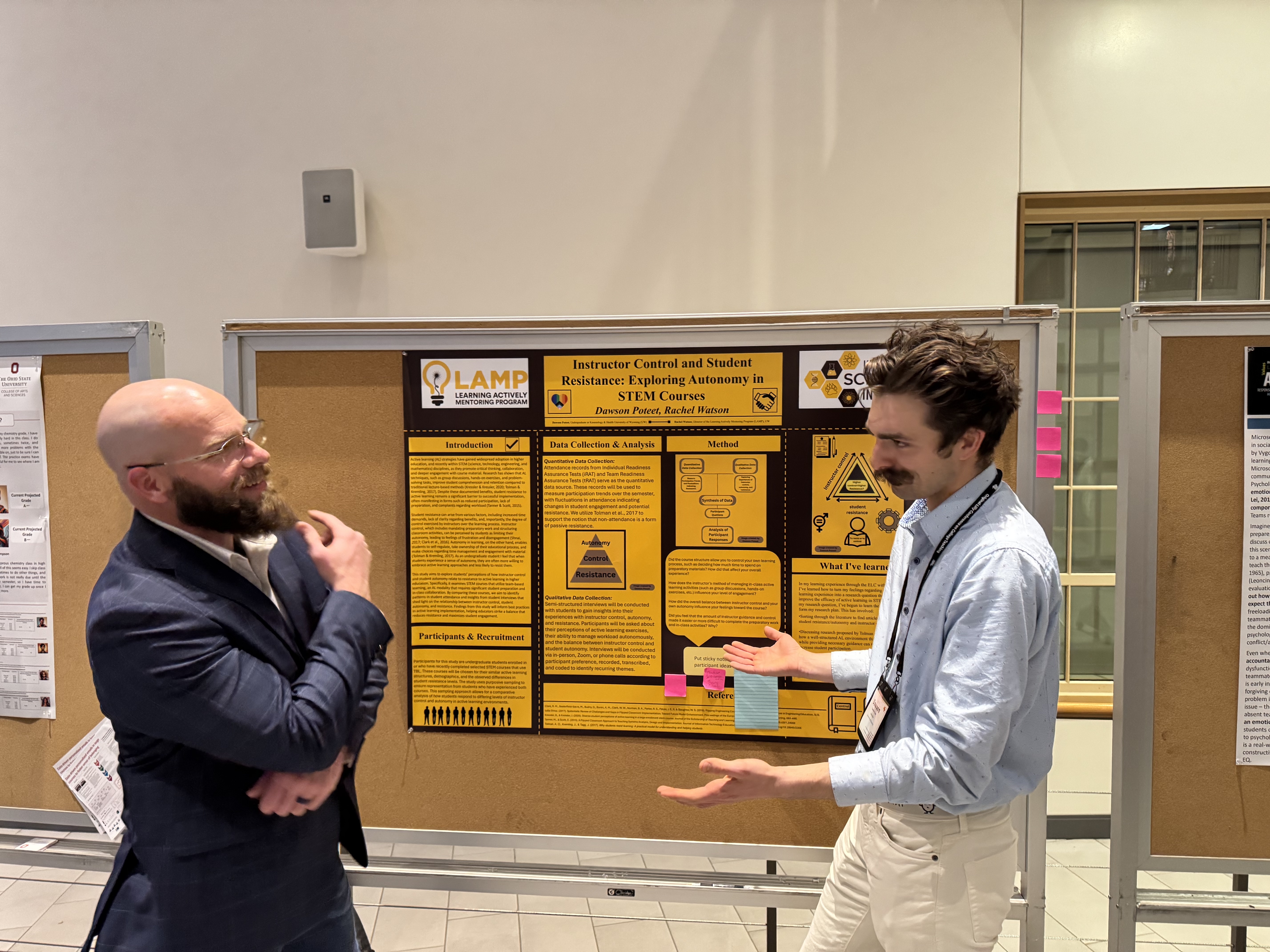 |
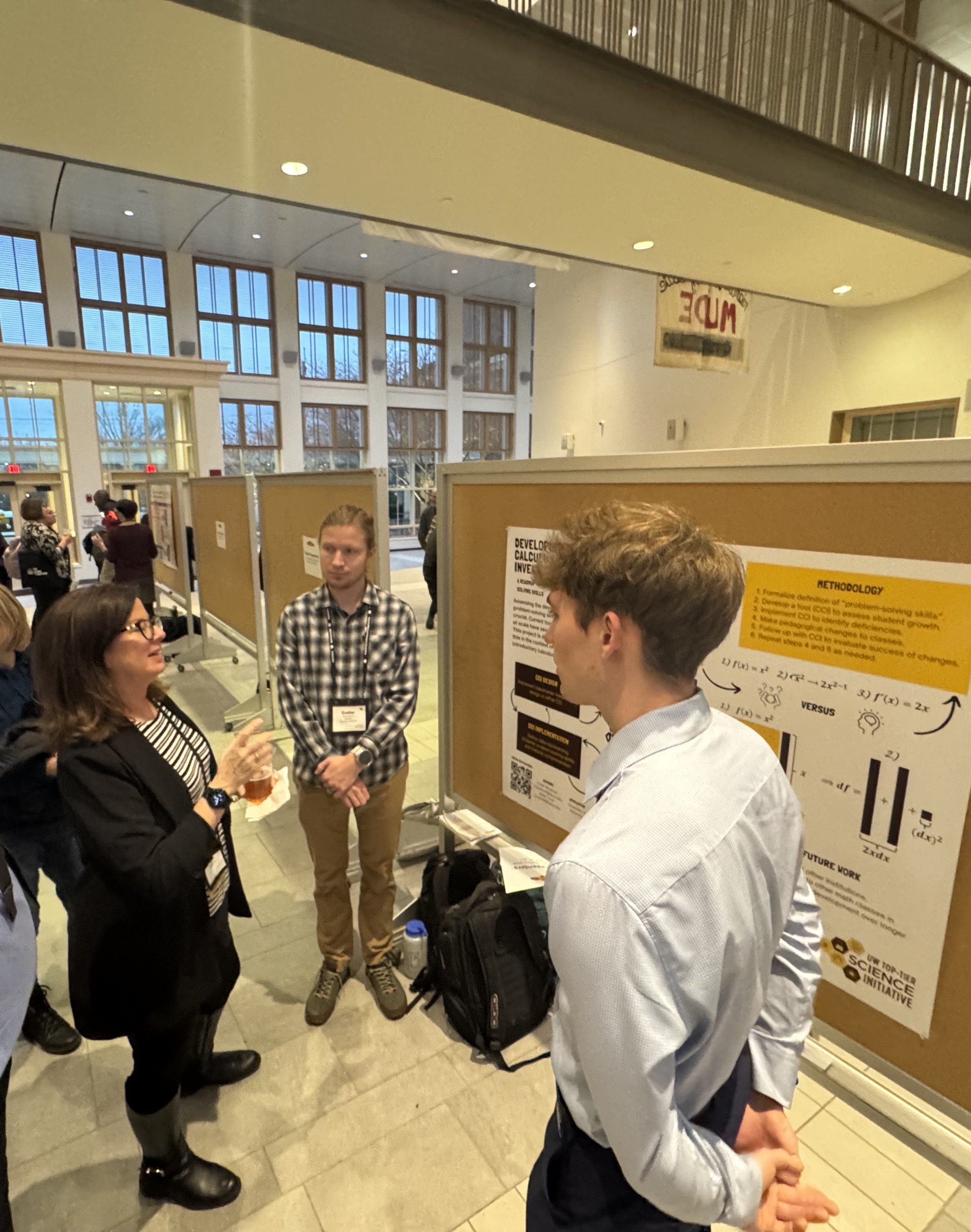 |
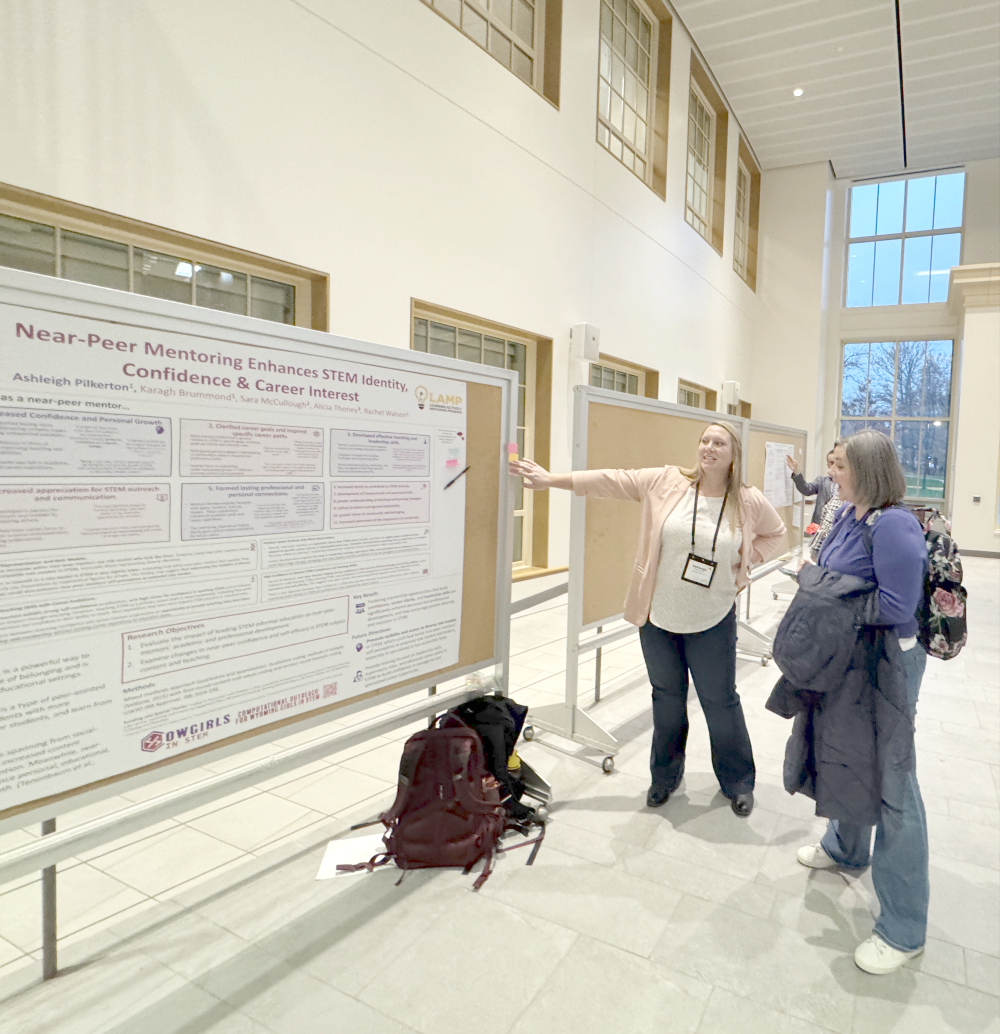 |
|
November 28, 2022
Seven Learning Actively Mentoring Program (LAMP) educators from the University of Wyoming and Laramie County Community College recently presented projects at the Original Lilly Conference on College Teaching at Miami University in Oxford, Ohio...(follow this link to the rest of this news release). “Every member of the LAMP learning community shared an evidence-based project that showcased and simultaneously modeled student-engaged pedagogy,” says Rachel Watson, UW Science Initiative LAMP director. “Their sessions were exemplar at a conference of highly capable SoTL scholars.” |
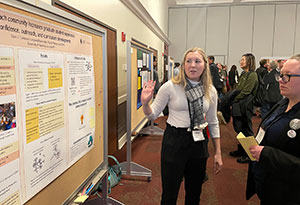 Claire Campion, a UW zoology and physiology graduate student from Rochester, Minn.,
discusses her poster on the assessment of the motivation and growth of graduate students
in a grassroots outreach group called COPSE (Community Outreach Program on STEAM Engagement)
during the Original Lilly Conference on College Teaching. (Photo taken by Rachel)
|
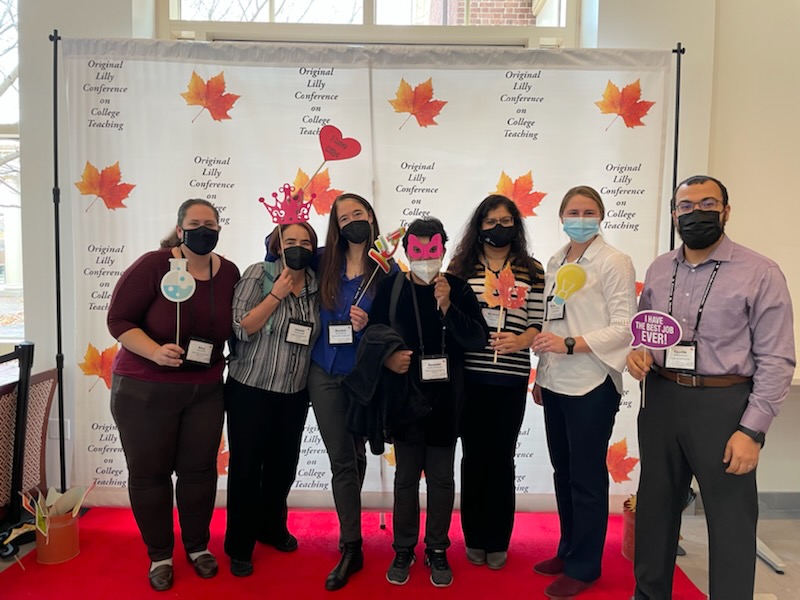
Pictured above from left to right is Amy Rhoad, Christi Boggs, Rachel Watson, Deepthi Amarasuriya, Reshmi Singh, McKensie Phillips and Tawfik Elsehabi
From November 17th to the 21st, five LAMP Educators and two mentors traveled to the Original Lilly Conference on College Teaching at Miami University in Oxford, Ohio. The LAMP Educators all completed the 2019-2020 yearlong LAMP training and then became a part of an Educator Learning Community (ELC) that gathered regularly for over a year. Throughout the ELC, these instructors expanded their knowledge of active, inclusive, student-centered pedagogies. All educators completed a Scholarship of Teaching and Learning (SoTL) project that they presented as either an oral or poster at the Lilly Conference. Miami University is the cradle of the Scholarship of Teaching and Learning (SoTL) and the conference organizers are the preeminent authorities on both SoTL and Faculty Learning Communities (FLCs).
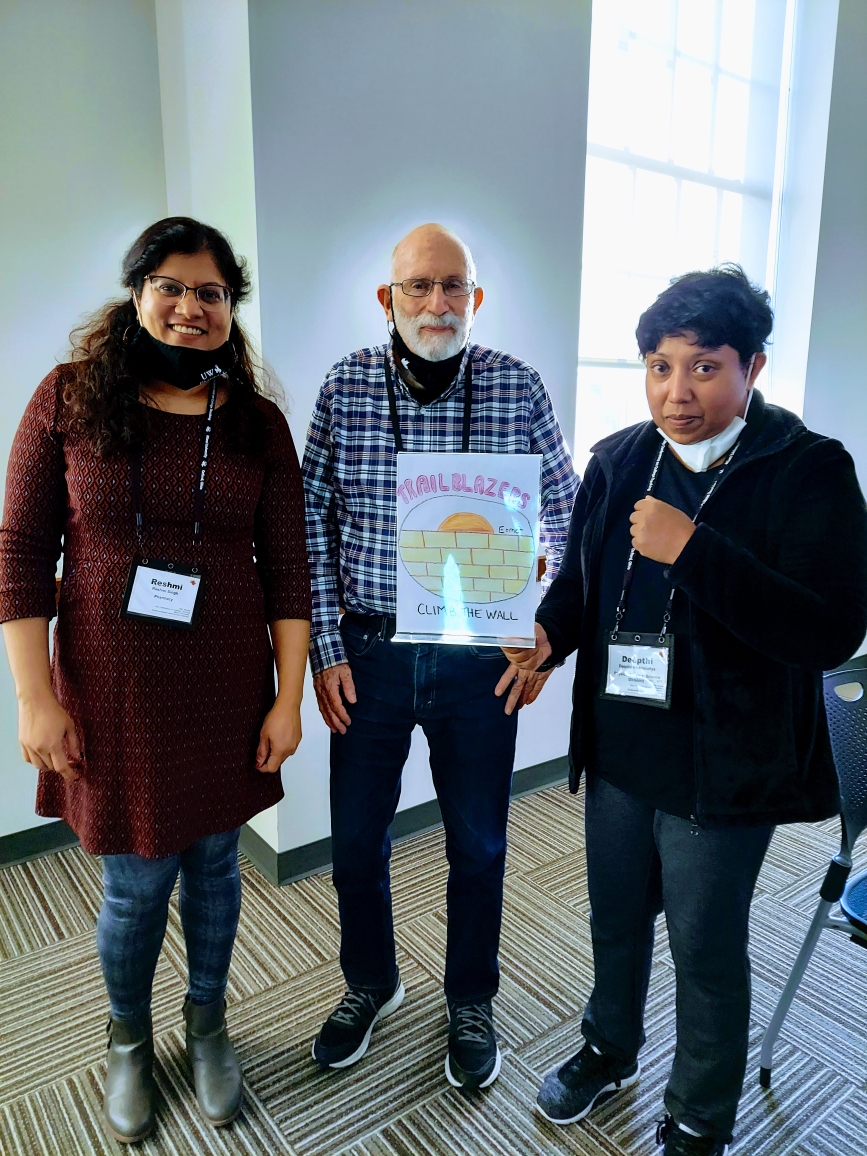
Pictured above from left to right is Reshmi Singh, Milton Cox and Deepthi Amarasuriya. Deepthi and Reshmi took part in Milt's Faculty Learning Community Workshop.
Deepthi Amarasuriya from Northwest College in Powell, WY presented a poster centering on a novel active learning strategy she has implemented for her physics courses. She calls this method the “Layered Approach” and it is an inclusive pedagogy allowing students to learn in different ways using different resources and through metacognitive and small group approaches.
Dr. Tawfik Elshehabi of UW’s Petroleum Engineering Department led conference attendees through an interactive investigation of teaching philosophy construction. Attendees were invited to engage in written, visual and multimodal versions of his philosophy and were given time to generate these formats of their own philosophies to share with their students.
Dr. Reshmi Singh (Pharmacy) and McKensie Harris (Animal Sciences) presented on a study entitled Exploring Multidisciplinary and International Engagement by a Faculty Cohort. This study utilized by qualitative and quantitative research methodologies to inquire into the multidisciplinary teaching, research and scholarship of educators at UW and Wyoming’s community colleges.
Amy Rhoad (Veterinary Science) presented about her use of case studies in a large, undergraduate medical microbiology course. She utilized a critical thought assessment strategy to explore impact of varying case study approaches. During her session, she immersed conference attendees in a mock food poisoning case study called, A Case of the Conference Blues.
McKensie Phillips was the last of LAMP ELC members to present her work on Knowledge Surveys. McKensie’s research shows that students’ knowledge/confidence is, on average, greater at the end of the semester than it is after an one course unit! LAMP Data Analyst, Ella DeWolf was invaluable in supporting McKensie’s statistical analysis and data visualization.
LAMP Mentors, Rachel Watson and Christi Boggs, presented a poster showing increased connectivity in the social network after yearlong LAMP and the subsequent ELC. This corresponds with educators’ decreased feelings of isolation, increased feelings of confidence and pedagogical knowledge. The social network analysis also reveals a disproportionate increase in advice giving for several ELC members after the second year in the ELC. This may indicate either the need for multiyear development or LC-style cohorts when facilitating educators in becoming opinion campus leaders and change agents.
When asked to reflect on the experience, the ELC members shared:
“Dr. Watson did an outstanding job on every step of this journey to the 2021 Lilly. I felt over-prepared and ahead of many schools. I highly recommend joining this incredible community of caring learners.” – Tawfik Elshehabi (Petroleum Engineering)
“I felt very validated to know that the POGIL model of teaching is very similar to the approach I developed [The Layered Approach].” – Deepthi Amarasuriya (NWC Physics)
“Even though I had seen my colleagues presentations before, in this context I was still able to learn something new.” – Amy Rhoad (Veterinary Science/College of Agriculture and Natural Resources, Academic and Student Programs)
“Being on this journey with these incredible educators has been renewing and inspiring.” – Christine Boggs (LAMP Mentor, Head of Digital Teaching and Learning)
“Feeling energized being with my ELC and others who care about learning & STUDENTS! Got to learn and get reminded about threshold concepts, mindset and of course building communities thru FLCs!”
Click the following link to read more info about this most successful Conference: https://www.uwyo.edu/news/2021/12/uw-lamp-educators,-mentors-present-projects-at-national-conference.html
Our inaugural class included educators from diverse STEM disciplines. These educators completed SoTL (Scholarship of Teaching and Learning) projects that were presented at the 2019 Original Lilly Conference for College Teaching. This pilot ELC has allowed us to see that involvement in LAMP increases the density of connections in the social network. This correlates with participants’ feelings and experiences changing from those of being alone/isolated to being part of a community. Additionally, their feelings of confidence, and capability to engage in educational research increase! And speaking of educational research, below are the descriptions and full presentations for each ELC member.
• Jessica Sutter (UW Physics and Astronomy). Real Problems, Real Data: Active Learning in a 14 Billion Lightyear Classroom. View the full presentation at: https://youtu.be/d3ycGsXdC88
• Kerry Sondgeroth, Michele Larson and Rachel Watson (UW Microbiology and Life Sciences). Measuring Changes in Students' Perception of Active Learning and Feelings of Inclusion. View the full presentation at: https://youtu.be/4a3vXgI3q1w
• Michele Larson (UW Life Sciences). Assessing Student Mindsets, Self-Assessment, and Learning. View the full presentation at: https://youtu.be/5rWJj9GQZys
• Michelle Mason (UW Physics and Astronomy). You're Not Teaching Me Anything!: Struggling With Incivility and Students Who Know Best. View the full presentation at: https://youtu.be/YQYEfSMk5-M
• Mariah Ehmke (UW Agriculture Economics). Facilitating Applied Economic Modeling in Undergraduate International Trade Policy Instruction. View the full presentation at: https://youtu.be/5sdQLHikXOg
• Jessica Sutter, Rachel Watson and Ed Nuhfer. Evolving the Statement of Teaching Philosophy: From Traditional to Multimodal. This was a poster.
• Rachel Watson, Christi Boggs and Sierra Jech. "Leaving the Light On": From Feeling Alone to Feeling Connected Within an Educator Learning Community. View the full presentation at: https://youtu.be/lYS-UvaXpfk

